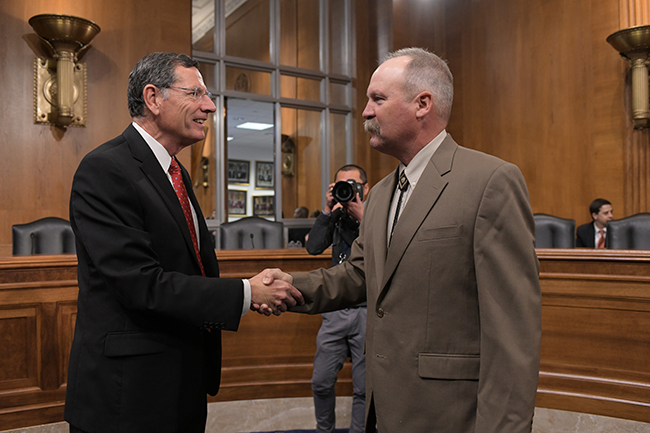Cook Testifies on Wildlife Disease Before Senate Committee

Dr. Walter Cook, a clinical associate professor in the Texas A&M College of Veterinary Medicine & Biomedical Sciences’ (CVM) Department of Veterinary Pathobiology, was recently invited to testify before the full Senate Committee on Environment and Public Works as a subject matter expert.
During the Committee’s “Examining the Impacts of Diseases on Wildlife Conservation and Management” hearing on Oct. 16, Cook used his 25 years of experience as a wildlife population health veterinarian to educate the committee on high-consequence disease management in wildlife.
“I really was really honored to be asked by the U.S. Senate Environment and Public Works Committee to testify,” Cook said. “Chairman (and Sen. John) Barrasso and Ranking Member Thomas Carper were very gracious; they both greeted me before the hearing. It really helped make me feel at ease.”
In his testimony, Cook described five wildlife diseases that he finds particularly concerning—chronic wasting disease, bighorn sheep respiratory disease complex, white-nose syndrome, chytrid fungus, and anthrax.
“It is important that funding be made available to address wildlife disease management,” Cook said in his testimony. “I’m particularly concerned with the lack of federal funds available for research aimed at real-world management dilemmas.”
Cook provided the committee with a five-minute oral testimony and a seven-page written testimony that included photographic evidence of common wildlife diseases.
“Chairman Barrasso’s staff, particularly Kaitlynn Glover, were very helpful,” Cook said. “I also really appreciate Andrew Harding, majority counsel for the committee, for his assistance in preparing me and making sure I was comfortable.
“Most importantly, Taylor Sexton, assistant director at the Office of Federal Relations for the Texas A&M University system, was extremely helpful,” he said. “He made sure I got where I needed to be, had everything I needed, and even fed me a great lunch at the Old Ebbitt after the hearing.”
The goal of the hearing, which took place in the Dirksen Senate Office Building in Washington, D.C., was to discover what the U.S. government can do to combat the growing problem of wildlife disease, which can also impact human health and the economy.
“Successful wildlife conservation and management depends on keeping wildlife populations healthy,” Barrasso said during the hearing. “Unlike in captive animals, diseases in wild animals are often difficult to prevent, detect, and control.”
Stephen D. Guertin, deputy director for program management and policy at the U.S. Fish and Wildlife Service, and Holly Niederriter, wildlife biologist at the Department of Natural Resources and Environmental Control, also spoke as expert witnesses at the hearing
###
For more information about the Texas A&M College of Veterinary Medicine & Biomedical Sciences, please visit our website at vetmed.tamu.edu or join us on Facebook, Instagram, and Twitter.
Contact Information: Jennifer Gauntt, Interim Director of CVM Communications, Texas A&M College of Veterinary Medicine & Biomedical Science; jgauntt@cvm.tamu.edu; 979-862-4216


